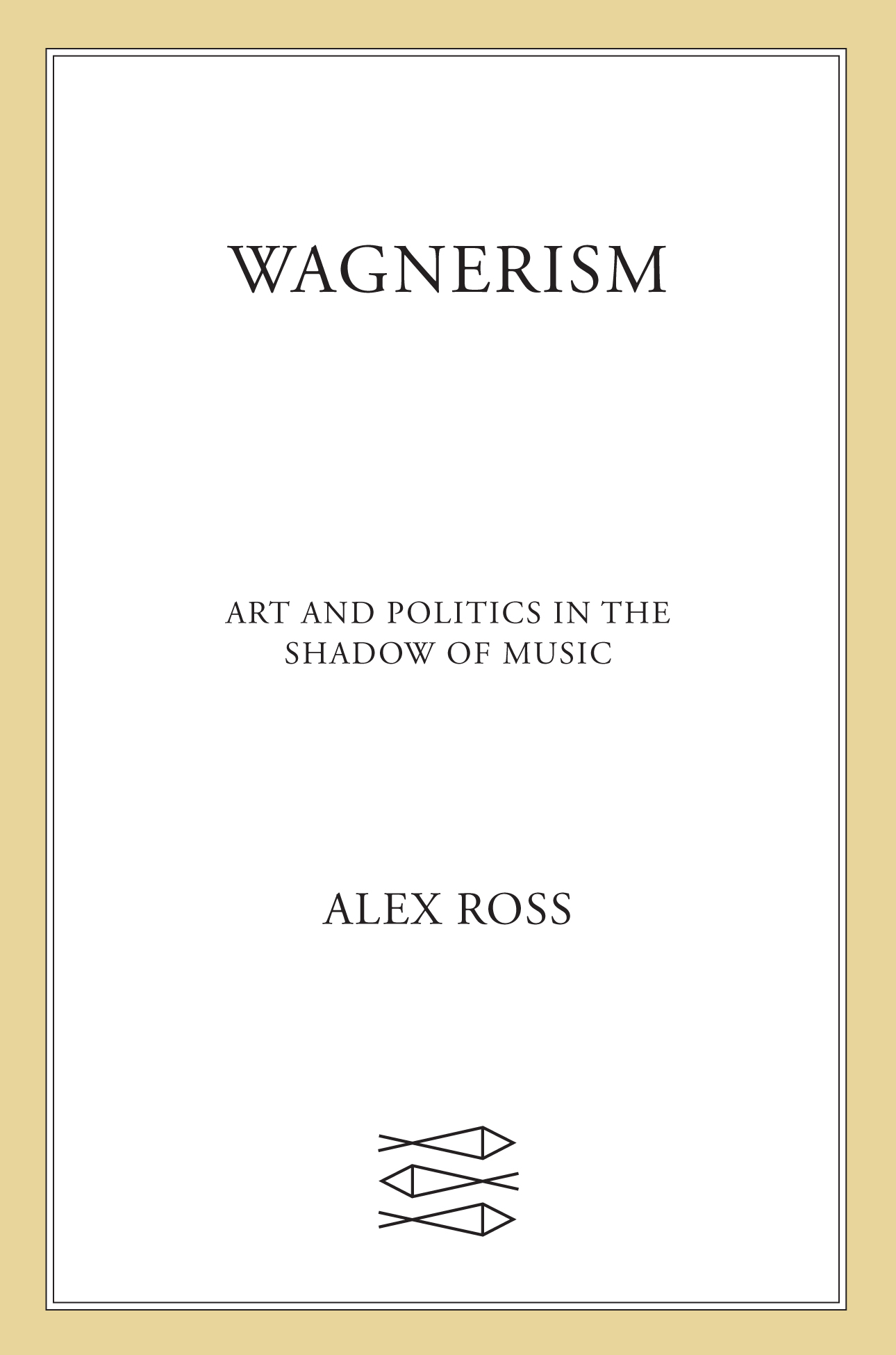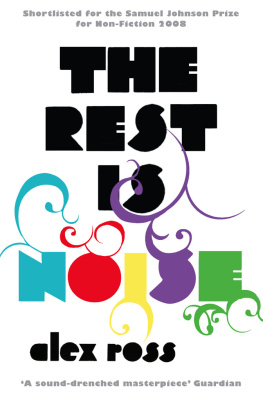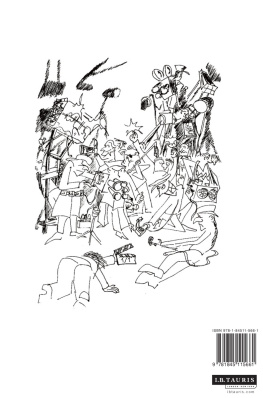Alex Ross - Wagnerism
Here you can read online Alex Ross - Wagnerism full text of the book (entire story) in english for free. Download pdf and epub, get meaning, cover and reviews about this ebook. publisher: Farrar, Straus and Giroux, genre: Detective and thriller. Description of the work, (preface) as well as reviews are available. Best literature library LitArk.com created for fans of good reading and offers a wide selection of genres:
Romance novel
Science fiction
Adventure
Detective
Science
History
Home and family
Prose
Art
Politics
Computer
Non-fiction
Religion
Business
Children
Humor
Choose a favorite category and find really read worthwhile books. Enjoy immersion in the world of imagination, feel the emotions of the characters or learn something new for yourself, make an fascinating discovery.

- Book:Wagnerism
- Author:
- Publisher:Farrar, Straus and Giroux
- Genre:
- Rating:5 / 5
- Favourites:Add to favourites
- Your mark:
- 100
- 1
- 2
- 3
- 4
- 5
Wagnerism: summary, description and annotation
We offer to read an annotation, description, summary or preface (depends on what the author of the book "Wagnerism" wrote himself). If you haven't found the necessary information about the book — write in the comments, we will try to find it.
Wagnerism — read online for free the complete book (whole text) full work
Below is the text of the book, divided by pages. System saving the place of the last page read, allows you to conveniently read the book "Wagnerism" online for free, without having to search again every time where you left off. Put a bookmark, and you can go to the page where you finished reading at any time.
Font size:
Interval:
Bookmark:


The author and publisher have provided this e-book to you for your personal use only. You may not make this e-book publicly available in any way. Copyright infringement is against the law. If you believe the copy of this e-book you are reading infringes on the authors copyright, please notify the publisher at: us.macmillanusa.com/piracy.
In memory of Andrew Patner
Wagner sums up modernity. It cant be helped, one must first become a Wagnerian.
FRIEDRICH NIETZSCHE
The best in this kind are but shadows; and the worst are no worse, if imagination amend them.
A Midsummer Nights Dream

Only down deep
is it trusty and true:
false and base
is the revelry above!
At the end of Das Rheingold, the first part of Richard Wagners operatic cycle The Ring of the Nibelung, the gods are entering the newly built palace of Valhalla and the Rhinemaidens are singing in dismay. The river nymphs know that Valhalla rests on a corrupt foundation, its laborers paid in gold extracted from the waters depths.
On the evening of February 12, 1883, some three decades after Rheingold was finished and seven years after the Ring was first performed complete, Wagner played the Rhinemaidens lament on the piano. As he got into bed, he remarked, I am fond of them, these subordinate beings of the deep, with their yearning.
Wagner was sixty-nine years old, and in poor health. Since September 1882, he had been living with his family in a side wing of the Palazzo Vendramin Calergi, on the Grand Canal, in Venice. Sequestered in what he called his blue grottoa chamber decorated in multicolored satin fabrics and white lacehe was writing an article titled On the Womanly in the Human. When it was done, he had said, he would begin composing symphonies.
The next day, clad in a pink dressing gown, Wagner continued to work on his essay. In a corner of a blank page, he wrote: Nonetheless, the process of the emancipation of women goes ahead only amid ecstatic convulsions. Lovetragedy. Elsewhere in the family suite, Cosima Wagner, the composers second wife, was playing Schuberts song Lob der Trnen (In Praise of Tears) at the piano, in an arrangement by her father, Franz Liszt.
Sometime after two, Wagner cried out, asking for Cosima and his doctor, Friedrich Keppler. He was found writhing in pain, a hand clutched to his heart. A maid and a valet carried him to a settee, next to a window facing the Grand Canal. When the valet tried to remove the gown, something fell to the floor, and Wagner uttered his apparent last words: My watch! At around 3 p.m., Dr. Keppler entered, and established that the Meister, the Sorcerer of Bayreuth, the creator of the Ring, Tristan und Isolde, and Parsifal, the man whom Friedrich Nietzsche described as a volcanic eruption of the total undivided artistic capacity of nature itself, whom Thomas Mann called probably the greatest talent in the entire history of art, was dead.
B y late afternoon, a crowd had gathered at the street entrance of the Palazzo Vendramin. Dr. Keppler came to the door and said, Richard Wagner died an hour ago, following a heart attack. Murmurs went up: Richard Wagner dead, dead. The news spread through a city drenched in rain: Riccardo Wagner il famoso tedesco, Riccardo Wagner il gran Mastro del Vendramin morto! John W. Barkers book Wagner and Venice quotes the first obituary, which ran the next morning in La Venezia:
Deceased yesterday in our city was the musical genius of Germany.
The composer of Lohengrin was for some months among us with his wife and his delightful children, hoping that the mild air of our heaven might have served to restore him in health, delicate for some time
Last evening we went to the Palazzo Vendramin Calergi to have news.
Riccardo Wagner is deadthere it was toldand his widow, kneeling before his corpse, crazed with grief, hardly believing that her beloved companion sleeps the eternal repose!
How many memories crowd upon our mindthe bold struggles that he sustained, the sublime victories that he achievedthe art that he createdthe bitter enemies he hadthe fanatical partisans that idolized him as a Godthe crowned kings who knelt down before him!
No morea corpse!
But from him rises a voice that will not dieand perhaps will become in time more powerful, more hearkened to, more beloved.
Five thousand telegrams were reportedly dispatched from Venice in a twenty-four-hour period. The news traveled as far as Dunedin, New Zealand, where Fergus Hume composed a sonnet hailing Wagners schylean music.
Voluminous obituaries reviewed the composers epic life: his middle-class origins; his early struggles in provincial posts; his failed first stab at Parisian fame; his years as a progressive opera director in Dresden; his participation in the revolutions of 184849; his Swiss exile; his quarter-century of work, with long interruptions, on the Ring; his disorderly private life, including two marriages and interminable financial crises; his miraculous rescue by King Ludwig II of Bavaria; the building of a festival theater in Bayreuth, Germany; the premiere there of the Ring, in 1876, with two emperors and two kings in attendance; and the mystical farewell of Parsifal, in 1882. The life of Richard Wagner affords a remarkable illustration of the results of persistent effort in carrying out to its conclusion the inspiration of genius, the New York Times intoned. The more unsavory aspects of Wagners character were usually omitted. The New York Daily Tribune, in an obituary that consumed more than a page of fine newsprint, gave only one sentence to his vicious attacks on Jews.
Radical-minded Wagnerites thought that the mainstream tributes had got it all wrong. The American firebrand Benjamin Tucker wrote in his journal Liberty: None of the newspapers, in their obituaries of Richard Wagner, the greatest musical composer the world has yet seen, mention the fact that he was an Anarchist. Such, however, is the truth. For a long time he was intimately associated with Michael Bakounine, and imbibed the Russian reformers enthusiasm for the destruction of the old order and the creation of the new. Moncure Conway, a freethinker, abolitionist, and pacifist from the American South, made a similar argument in a memorial sermon in London. Through artists like Wagner, Conway said, the old order has become unreal.
Fellow composers, whatever their opinion of the man, were shocked by his departure. Vagner morto!!! wrote Giuseppe Verdi, Wagners Italian antipode. Reading the news yesterday, I was horror-struck, I can tell you! There is no question. It is a great personality that has disappeared! A name that leaves a most powerful imprint on the History of Art!!! Johannes Brahms, seen as Wagners chief German adversary, sent a large laurel wreath to the funeral. Young zealots were in despair. Gustav Mahler ran through the streets in tears, crying, The Master has died! Pietro Mascagni secluded himself for several days, writing at high speed the Elegia per orchestra in morte di R. Wagner
Font size:
Interval:
Bookmark:
Similar books «Wagnerism»
Look at similar books to Wagnerism. We have selected literature similar in name and meaning in the hope of providing readers with more options to find new, interesting, not yet read works.
Discussion, reviews of the book Wagnerism and just readers' own opinions. Leave your comments, write what you think about the work, its meaning or the main characters. Specify what exactly you liked and what you didn't like, and why you think so.









